初二英语资料
初二英语知识点归纳
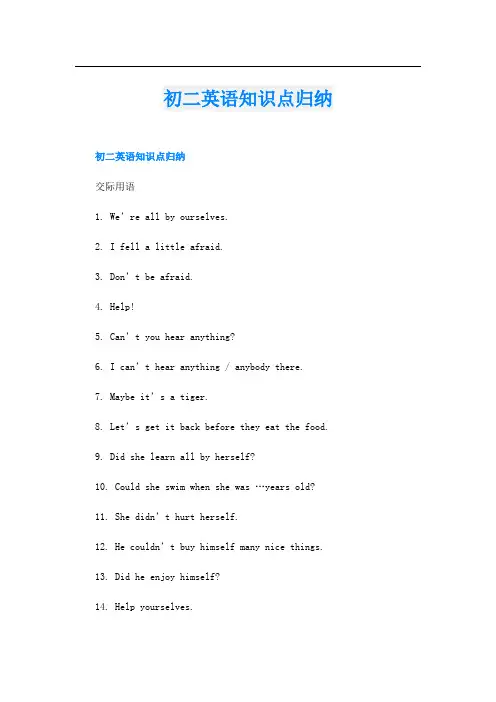
初二英语知识点归纳初二英语知识点归纳交际用语1. We’re all by ourselves.2. I fell a little afraid.3. Don’t be afraid.4. Help!5. Can’t you hear anything?6. I can’t hear anything / anybody there.7. Maybe it’s a tiger.8. Let’s get it back before they eat the food.9. Did she learn all by herself?10. Could she swim when she was …years old?11. She didn’t hurt herself.12. He couldn’t buy himself many nice things.13. Did he enjoy himself?14. Help yourselves.15. Bad luck!16. Come on!17. Well done! Congratulations (to…)!初二英语知识点整理1.短语动词小结常见动词短语结构有下面几种:(1)动词+副词如:give up 放弃;turn off 关掉;stay up 熬夜这种结构有时相当于及物动词,如果其宾语是代词,就必须放在动词和副词之间,如果是名词,则既可插在动词和副词之间,也可放在短语动词后。
(2)动词+介词如:listen of 听;look at 看;belong to 属于这种结构相当于及物动词,后面跟宾语。
(3)动词+副词+介词如:come up with 提出,想出; run out of 用完,耗尽(4)动词+名词+介词如:take part in参加;catch hold of 抓住2. each 每个,各自的,强调事物的个别情况,常与of 连用every 每个,每一个的,一切的,有“全体”的意思不能与of 连用3. help sb. (to) do 帮助某人做某事 help him (to) studyhelp sb. with sth. 帮助某人做某事 help him with Englishhelp do 帮助做某事 help study4. spend...doing... 花费…做…I spent a day visiting Beijing. 我花了一天的时间去参观北京。
八年级考试必备知识点英语
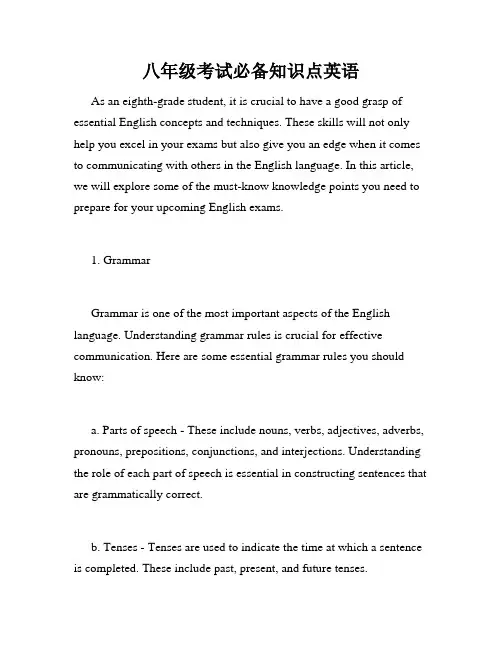
八年级考试必备知识点英语As an eighth-grade student, it is crucial to have a good grasp of essential English concepts and techniques. These skills will not only help you excel in your exams but also give you an edge when it comes to communicating with others in the English language. In this article, we will explore some of the must-know knowledge points you need to prepare for your upcoming English exams.1. GrammarGrammar is one of the most important aspects of the English language. Understanding grammar rules is crucial for effective communication. Here are some essential grammar rules you should know:a. Parts of speech - These include nouns, verbs, adjectives, adverbs, pronouns, prepositions, conjunctions, and interjections. Understanding the role of each part of speech is essential in constructing sentences that are grammatically correct.b. Tenses - Tenses are used to indicate the time at which a sentence is completed. These include past, present, and future tenses.Understanding tenses is important when writing essays, stories, or any other form of written communication.c. Subject-verb agreement - This rule requires that the verb of the sentence agrees with the subject in number and tense.2. VocabularyAn expansive vocabulary is critical to achieving success in English exams. Here are some essential vocabulary tips that will help you build your comprehension and usage skills:a. Word roots - Understanding word roots can help you deduce the meaning of unfamiliar words. For example, the root "spect" means "to see." Words like inspect, perspective, and spectacles are all derived from this root.b. Context clues - These include information from the sentence or paragraph surrounding an unfamiliar word, which can help you understand its meaning.c. Figures of speech - Similes, metaphors, and idioms are examples of figures of speech. Learning to identify figures of speech can help you understand and use these expressions to convey a specific message.3. Reading comprehensionReading comprehension is a critical skill that you must master to be successful in English exams. Here are some tips that will help you analyze texts more effectively:a. Active reading - Engage with the text by highlighting or taking notes on significant information. This strategy can help you retain more information and make connections between different parts of the text.b. Understanding the structure - Understanding the structure of a text, including its introduction, body, and conclusion, can help you understand the overall message.c. Analyzing the author's purpose - Analyzing why the author wrote the text and the intended audience can help you understand the message more thoroughly.4. WritingWriting is another essential aspect of English exams. Here are some tips to help you improve your writing skills:a. Outlining - Outlining your essay or story can help you organize your thoughts and create a more cohesive piece of writing.b. Writing structure - Using an appropriate writing structure, such as the five-paragraph essay, can help you organize your writing more effectively.c. Editing - Proofread and edit your work carefully to ensure that it's free of grammatical errors, spelling errors, and punctuation mistakes.In conclusion, these are some of the key knowledge points you must master for your eighth-grade English exams. By knowing the essential grammar rules, building your vocabulary, improving your reading comprehension, and honing your writing skills, you'll be better equipped to achieve success. Remember, practice, practice, practice. The more you work on these skills, the better you'll become. Good luck with your exams!。
初二英语全册复习资料

英语八年级上册知识要点Unit 1 How often do you exercise?重点语法:频率副词询问别人做某事的频繁程度提问用How often 引导特殊疑问句回答用always, sometimes, twice a day 等频率副词。
例句:A: How often do you watch TV?(你多长时间看一次电视?)B: I watch TV every day.(我每天都看电视。
)A: What's your favorite program?(你最喜欢的节目是什么?)B: It’s Animal World。
(是《动物世界》。
)A:How often do you watch it?(你多长时间看一次这个节目?)主要频率副词的等级排序:always(总是) > usually (通常)〉often(经常)> sometimes(有时)> hardly ever(很少) > never(从不)隔一段时间做某事数次用数词+ 时间间隔的结构构成.如:once a week 一周一次(“一次"用特殊词once)twice a day 一天两次(“两次”用特殊词twice)three times a month 一个月三次(三次或三次以上用基数词+ times 的结构构成)four times a year 一年四次特殊疑问句:wh-questions:what,who,where, when,which,whose, why,whom等。
特殊疑问句的构成及用法:结构:特殊疑问词+ 一般疑问句, 即:特殊疑问词+be/助动词/情态动词+主语+谓语/表语(+其他)疑问代词:1)Who:谁。
做主语,用来指人Who is the boy under the tree?2)Whom 谁,做宾语,用来指人Whom are you writing to?3) Whose 谁的,用来指所属关系,如果做定语,一般后接名词Whose pen is this?4) Which 哪个,哪些,用来指对人或物在一定范围之内进行选择Which grils will in the sports meeting?Which pen is Lily’s?5)What什么,通常指物,也可指人,一般用在没有指出范围的情况下What can you see in the picture?What are you doing now?疑问副词:When:何时,询问时间When will she come back?Where何地,询问地点,Where do you come from?Why为什么,询问原因,Why are you late for school?How 如何,询问手段、方式、工具以及程度等How do you usually go to school?How old多大,询问年龄,How old is Jim’s little brother?How many/much多少,询问数量How many birds are there in the tree?How far多远,询问距离, How far is it form your home to school?How long多长,多久,询问时间的长度或距离How long will you stay in Beijing?How often多长时间按一次,询问频率How often do you go to see your grandparents?How soon多久,询问时间How soon will you come back?频率副词:表示动作发生的频率,never,sometimes, often, usually,always。
八年级英语复习资料
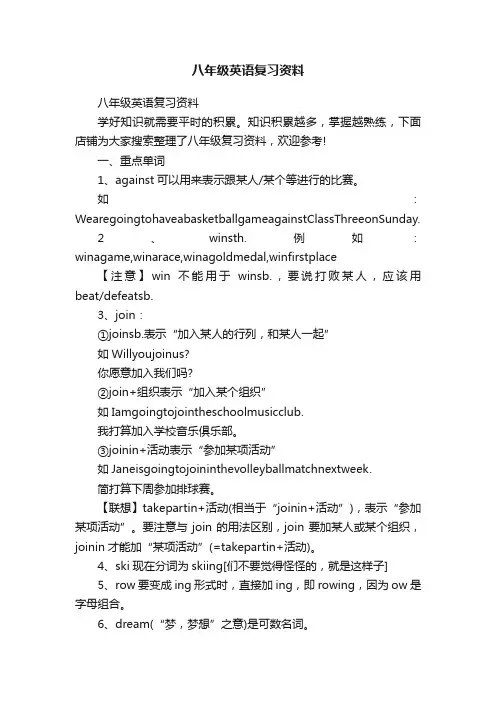
八年级英语复习资料八年级英语复习资料学好知识就需要平时的积累。
知识积累越多,掌握越熟练,下面店铺为大家搜索整理了八年级复习资料,欢迎参考!一、重点单词1、against可以用来表示跟某人/某个等进行的比赛。
如:WearegoingtohaveabasketballgameagainstClassThreeonSunday.2、winsth.例如:winagame,winarace,winagoldmedal,winfirstplace【注意】win不能用于winsb.,要说打败某人,应该用beat/defeatsb.3、join:①joinsb.表示“加入某人的行列,和某人一起”如Willyoujoinus?你愿意加入我们吗?②join+组织表示“加入某个组织”如Iamgoingtojointheschoolmusicclub.我打算加入学校音乐俱乐部。
③joinin+活动表示“参加某项活动”如Janeisgoingtojoininthevolleyballmatchnextweek.简打算下周参加排球赛。
【联想】takepartin+活动(相当于“joinin+活动”),表示“参加某项活动”。
要注意与join的用法区别,join要加某人或某个组织,joinin才能加“某项活动”(=takepartin+活动)。
4、ski现在分词为skiing[们不要觉得怪怪的,就是这样子]5、row要变成ing形式时,直接加ing,即rowing,因为ow是字母组合。
6、dream(“梦,梦想”之意)是可数名词。
7、job是可数名词,work是不可数名词(work还可以做动词)。
8、exercise①跟体育运动有关的运动、锻炼,是不可数名词。
但要注意如果是做早操或眼保健操exercise要加s②指书本上的练习、作业,是可数名词。
9、①ill不能作定语,一般作表语。
②sick可作定语也可作表语。
Thechildisill.也可说Thechildissick.asickchild(不能说anillchild)10、competition竞赛[可数名词]11、score⑴作为动词是“得分”的意思。
八年级英语182个知识点
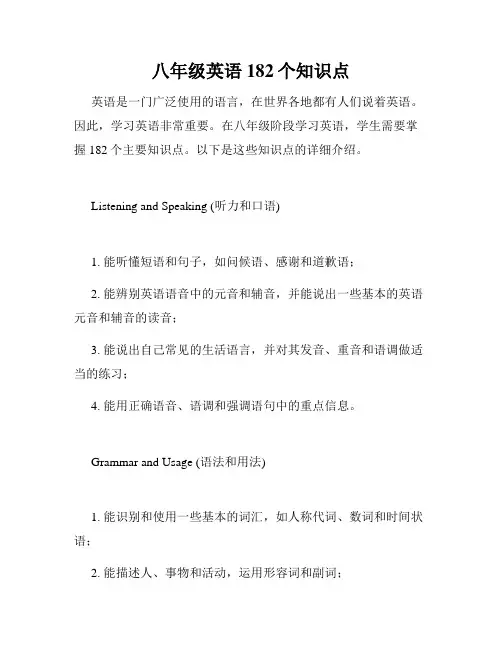
八年级英语182个知识点英语是一门广泛使用的语言,在世界各地都有人们说着英语。
因此,学习英语非常重要。
在八年级阶段学习英语,学生需要掌握182个主要知识点。
以下是这些知识点的详细介绍。
Listening and Speaking (听力和口语)1. 能听懂短语和句子,如问候语、感谢和道歉语;2. 能辨别英语语音中的元音和辅音,并能说出一些基本的英语元音和辅音的读音;3. 能说出自己常见的生活语言,并对其发音、重音和语调做适当的练习;4. 能用正确语音、语调和强调语句中的重点信息。
Grammar and Usage (语法和用法)1. 能识别和使用一些基本的词汇,如人称代词、数词和时间状语;2. 能描述人、事物和活动,运用形容词和副词;3. 能在句子中正确使用时态、语态和情态动词的形式;4. 能正确地使用短语动词、情态动词和情态副词。
Reading and Writing (阅读和写作)1. 能读懂短文和文章,并能根据文章内容回答问题;2. 能识别和使用一些常见的固定词组和词汇;3. 能准确地理解和描述书面信息,如公告、传单和广告;4. 能写一些简单的信件、卡片和消息。
Culture and Society (文化和社会)1. 能对英语国家的文化和习俗有基本的了解,如重要的节日、饮食文化和体育活动;2. 能描述和比较自己所处的文化和习俗;3. 能理解英语国家的一些社会问题,如环境问题、教育问题和移民问题。
Vocabulary and Idioms (词汇和习语)1. 能掌握一些基本的英语词汇和短语,如家庭成员、职业和日常活动;2. 能理解和使用一些常见的英语习语和成语;3. 能识别和使用一些具有多重意义的单词和短语;4. 能学习和记忆一些常见的英语缩略词和常用表达。
以上是八年级英语学习中的182个主要知识点。
掌握这些知识点并坚持练习可以有效提高英语水平。
通过阅读、听力、口语和写作的练习,学生可以加强自己的英语技能,让自己在未来的学习生活和工作中更好地应对各种英语状况。
八年级全册知识点英语
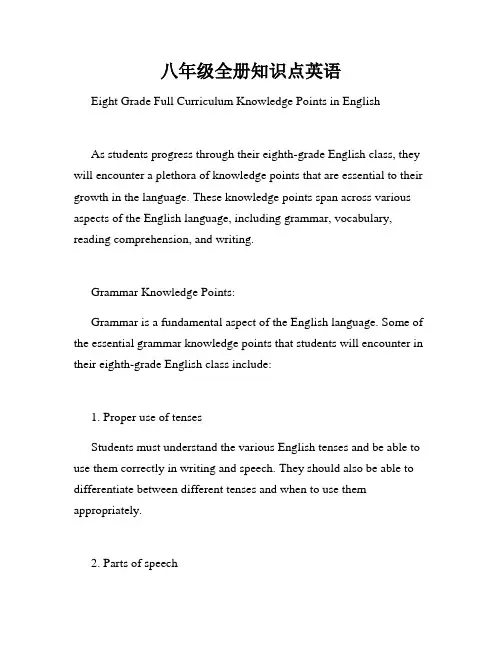
八年级全册知识点英语Eight Grade Full Curriculum Knowledge Points in EnglishAs students progress through their eighth-grade English class, they will encounter a plethora of knowledge points that are essential to their growth in the language. These knowledge points span across various aspects of the English language, including grammar, vocabulary, reading comprehension, and writing.Grammar Knowledge Points:Grammar is a fundamental aspect of the English language. Some of the essential grammar knowledge points that students will encounter in their eighth-grade English class include:1. Proper use of tensesStudents must understand the various English tenses and be able to use them correctly in writing and speech. They should also be able to differentiate between different tenses and when to use them appropriately.2. Parts of speechStudents will learn the various parts of speech, including nouns, verbs, adjectives, pronouns, adverbs, and conjunctions. They will also learn how to use these parts of speech in sentences correctly.3. PunctuationCorrect use of punctuation is critical in the English language. Students should be able to use punctuation marks such as commas, periods, question marks, and exclamation marks appropriately to enhance their sentences' clarity.Vocabulary Knowledge Points:A good vocabulary is key to effective communication in the English language. Some of the essential vocabulary knowledge points that students will encounter in their eighth-grade English class include:1. Synonyms and antonymsStudents will learn different words' synonyms and antonyms to improve their writing and speech. This knowledge will enable them to express themselves correctly and accurately.2. Root words and affixesStudents will study the various root words and affixes to understand how words are constructed. This knowledge will help them to decipher the meaning of unfamiliar words.3. Idioms and figurative languageStudents will learn idiomatic expressions and figurative language, such as similes, metaphors, and hyperbole, to enrich their writing and speech.Reading Comprehension Knowledge Points:Reading is a fundamental skill in language acquisition. Some of the essential reading comprehension knowledge points that students will encounter in their eighth-grade English class include:1. Understanding main ideas and detailsStudents will learn how to identify the main ideas and details in a text to understand the author's message better.2. Analyzing texts for meaningStudents will learn how to analyze texts to understand their meaning, themes, and context fully.3. InferringStudents will learn how to draw conclusions by inferring information from a text.Writing Knowledge Points:Effective writing skills are critical to success in the English language. Some of the essential writing knowledge points that students will encounter in their eighth-grade English class include:1. Writing a clear thesis statementStudents will learn how to write a clear and concise thesis statement that captures the essence of their argument.2. Developing paragraphs with supporting evidenceStudents will learn how to develop paragraphs with supporting evidence to substantiate their arguments.3. Editing and revisingStudents will learn how to edit and revise their writing to improve clarity, coherence, and grammar.In conclusion, eighth-grade English is a rich and diverse subject that covers a wide range of knowledge points. Students must master these knowledge points to develop their English language skills fully, enabling them to communicate with fluency, accuracy, and confidence.。
八年级英语期末复习资料
八年级英语期末复习资料八年级英语期末复习资料英语是一门重要的学科,也是我们与世界沟通的桥梁。
对于八年级学生来说,期末考试是一次重要的考验。
为了帮助大家更好地复习,我整理了一些八年级英语期末复习资料,希望对大家有所帮助。
一、语法知识1. 时态英语中有多种时态,如一般现在时、一般过去时、一般将来时等。
复习时要注意各种时态的构成和用法。
2. 从句从句是复合句的重要组成部分。
常见的从句有名词性从句、定语从句和状语从句。
要掌握从句的引导词和从句的结构。
3. 语态英语中有主动语态和被动语态。
要了解两种语态的构成和用法,并能够正确地转换句子的语态。
二、阅读理解阅读理解是英语考试中的重要部分。
要提高阅读理解的能力,可以多读一些英语文章,了解不同类型的文章,培养对文章的整体把握能力。
1. 短文阅读短文阅读是考试中常见的题型,要注意理解短文的主题、段落大意以及细节信息。
可以通过划线、圈出关键词等方式来帮助理解。
2. 根据短文内容回答问题在阅读短文时,要注意问题的提问方式,理解问题的意思,并从短文中找出相关信息来回答问题。
三、写作技巧写作是英语学习的重要环节,通过写作可以提高语言表达能力。
要注意以下几点:1. 语法准确在写作时要注意语法的准确性,尤其是时态、单复数、词性等方面的使用。
2. 词汇丰富要尽量使用多样化的词汇,避免重复使用相同的词汇。
可以通过读书、背单词等方式来扩大词汇量。
3. 逻辑清晰写作时要注意逻辑的连贯和清晰,可以使用连接词和过渡词来帮助表达思想。
四、口语练习口语是英语学习的重要组成部分,通过口语练习可以提高口语表达能力。
可以找一个语伴,进行对话练习,或者通过参加英语角等活动来提高口语能力。
五、听力训练听力是英语学习中的难点之一,要通过多听多练来提高听力能力。
可以选择一些适合自己水平的听力材料,多进行听力训练。
六、课外阅读除了课本上的内容,还可以选择一些适合自己水平的英语读物进行阅读。
通过课外阅读可以扩大词汇量,提高阅读理解能力。
初二英语复习资料完整版
初二英语知识点总结及练习来源: 作者:佚名点击量:229 【知识梳理】I. 重点短语1. on time准时2. best wishes 最好的祝福3. give a talk 作报告4. for example 例如5. short for…的简略形式6. a waste of time浪费时间7. go on a field trip去踏青8. go fishing去钓鱼9. I agree with you 我同意10. next week下星期11. the day after tomorrow后天The day before yesterday前天12. have a picnic野餐13. have some problems doing sth. 做某事遇到麻烦14. go the wrong way 走错路15. hurry up 赶快16. get together 一起17. in the open air 露天18. on Mid-Autumn Day 中秋节19. come over 从远方来;顺便拜访;抓住20. have to 不得不21. get home 回家22. agree with sb. 同意23. in the country 在乡下24. in town 在城里25. all the same 都一样26. in front of 在…前面27. on the left/right side 在左/右边28. next to 接着…29. up and down 上下30. keep healthy 保持健康31. grow up 长大,成长32. at the same time 同时33. the day before yesterday 前天35. last Saturday 上周六36. half an hour ago 半小时前37. a moment ago 一会儿前38. just now 刚才39. by the way 顺便说一下40. all the time 一直41. at first 起初II. 重要句型1. have fun doing sth. 做什么有趣2. Why don’t you…?你为什么不…3. We’re going to do sth.4. start with sth.5. Why not…?6. Are you going to…?7. be friendly to sb.8. You’d better do sth.9. ask sb. for sth.10. say goodbye to sb.11. Good luck(with sb)!III. 交际用语1.Welcome backto school!2.Excuse me. I’m sorry I’m late, because the traffic is bad.3.It doesn’t matter.4.Happy Teachers’ Day !5.That’s a good idea.6.What are you going to do?7.Where are we going ?8.What are we going to do ?9.I’m good at…10.It’s not far from…11. Are you free tomorrow evening?12.Would you and Lily like to come over to my home for Mid-Autumn Festival?13.I’m glad you can come.14.Thanks for asking us.15.How about another one?16.May I have a taste?17.Let me walk with you.18.What do you have to do?19.Do you live on a farm?20.Which do you like better, the city or the country?21.Which do you like best, dogs, cats or chickens?22.Shall we go at ten? Good idea!23.---Let’s make it half past one. ---OK.24.---Why not come a little earlier? ---All right.25.Excuse me. Where’s the nearest post office, please?26.It’s over there on the right.27.I’m sorry I don’t know.28.You’d better…29.Thank you all the same.30.Which bus do I take?31.Go along this road.32.What day was it yesterday?33.I’m sorry to hear that.34.I h ope you’re better now.35.Why did you call me?36.I called to tell…IV. 重要语法1.be going to的用法;2.形容词的比较级、最高级;3.形容词和副词的比较4.一般过去时【名师讲解】1. on the street / in the street表示“在街上”时,on the street 和in the street 都可以,在美国多用on the street, 在英国多用in the street. 例如:We have a house in the street. 我们在街上有座房子。
八年级英语上半期复习资料
英语半期复习资料(unit1——unit6)Unit11、exercise. 既可以作动词也可以作名词n ①锻炼、泛指运动,为不可数名词②具体指某项运动、锻炼,为可数名词eg . 眼保健操:eye exercises.2、as the result ……的结果3、as the result of sth. 作为……的结果4、try to do sth 尽力做某事5、try doing sth 尝试做某事6、try one’s best to do th 尽某人最大的努力做某事eg.I try my best to study.7、had better do sth 做好做某事eg . You’d better to study hard8、the difference between sth.eg .Please find the differences between these tow pictures.9、although=though虽然. 在句中although/though 和but 不能一起用10、keep+adj. 保持……11、a lot of + 名次复数/不可数名词=lots of +名次复数/不可数名词12、most + 可数名词复数=most of the + 可数名词复数13、how often 对频率提问,其回答有always,usually, often,sometimes,hardly ever,never.14、the same as 和什么一样eg . My book is the same as yours .15、be different from 和什么不同eg . My lifestyle is different from yours .16、believe+sb./sth.Believe+从句17、every day 与everydayevery day作状语,译为“每一天”。
初二英语知识清单
初二英语知识清单一、基础语法知识1. 词类分类:- 名词:用于表示人、物、地方或抽象概念。
- 动词:用于表示行为、状态或存在。
- 形容词:用于描述名词的性质或特征。
- 副词:用于描述动词、形容词、副词或句子。
- 代词:用于替代名词或其他代词。
- 介词:用于表示位置、时间、方向等概念。
- 连词:用于连接词、短语或句子。
- 冠词:用于限定名词。
- 感叹词:用于表示强烈的情感或感叹。
2. 句子结构:- 主语:句子的执行者或动作发出者。
- 谓语:表示主语动作、状态的动词或词组。
- 宾语:接受动作的对象或受事物。
- 宾语补足语:用于补充说明或描述宾语。
- 定语:修饰或限制名词。
- 状语:修饰动词、形容词或副词。
- 表语:用于说明主语的状态、性质或身份。
3. 时态和语态:- 简单现在时:表示经常发生的动作或普遍真理。
- 现在进行时:表示正在进行的动作。
- 简单过去时:表示过去某个时间发生的动作或状态。
- 过去进行时:表示过去某个时间正在进行的动作。
- 一般将来时:表示将来某个时间会发生的动作。
- 过去将来时:表示过去某个时间本应发生的动作。
- 主动语态:强调主语执行动作。
- 被动语态:强调动作的承受者或发生的结果。
二、词汇与短语1. 基础单词:- 单词分类:动物、自然、食物、家庭、学校、运动、人物等。
- 常用动词:be、have、do、go、get、make、see、say等。
- 常用形容词:happy、sad、big、small、good、bad等。
- 常用副词:slowly、quickly、well、hard等。
- 常用介词:in、on、at、to、for、with等。
- 常用连词:and、but、or、because等。
- 常用短语:in the morning、go shopping、play football等。
2. 常见固定搭配:- 提问:What's your name? How are you? Where is it?- 问路:Excuse me, where is the bank?- 表示喜好:I like swimming. She enjoys reading books.- 表示爱好:He is good at playing the piano. I am interested in painting.- 表示过去经历:I have been to Beijing. She has seen the movie.- 表示计划:I'm going to visit my grandparents next week.- 表示感谢:Thanks for your help. I appreciate it.三、常用句型1. 一般句型:- 肯定句:主语 + 动词 + 宾语。
- 1、下载文档前请自行甄别文档内容的完整性,平台不提供额外的编辑、内容补充、找答案等附加服务。
- 2、"仅部分预览"的文档,不可在线预览部分如存在完整性等问题,可反馈申请退款(可完整预览的文档不适用该条件!)。
- 3、如文档侵犯您的权益,请联系客服反馈,我们会尽快为您处理(人工客服工作时间:9:00-18:30)。
初二英语中考知识点总结Unit1 what' s the matter?1. It’s +形容词+ for sb. + to do sth. 做某事对某人来说是…的。
It’s important to do sth. 做某事很重要。
It’s important for me to eat a balanced diet. 平衡饮食对我来说是很重要的.It’s easy to do sth. 做某事是容易的。
It’s easy for us to find out the answer. 找出答案对我们来说是容易的。
2. 情态动词should的用法should是情态动词,它的基本用法是必须和其他动词一起构成谓语。
意为"应该......"。
should(应当,应该)用于所有人称,表示劝告或建议。
eg. ---I have a very bad cold. 我感冒很厉害。
---You should lie down and have a rest. 你应该躺下,多喝水。
3. maybe与may be(1)maybe是副词,译为“也许、可能”,相当于“perhaps”。
如:Maybe he can answer the question. 也许他能回答那个问题。
He maybe is from the USA, too. 他可能也来自美国。
(2)may be中的may为情态动词,译为“可能是......”。
如:He may be from the USA, too. 他可能也来自美国。
She may be our English teacher. 她可能是我们的英语老师。
4. few、a few、little、a little的区别和联系:(1)few / a few用来修饰可数名词,few表示否定意义,没有,几乎没有;a few表示肯定意义,有几个。
例如:He has few friends here, he feels lonely. 他这里没朋友,他感觉寂寞。
There are a few eggs in the basket. 篮子里有几个鸡蛋。
(2)little / a little用来修饰不可数名词,little表示否定意义,没有,几乎没有;a little 表示肯定意义,有一点儿。
例如:There is little ink in my bottle. Can you give me a little ink? 我的瓶子里没有墨水了,你能给我点儿墨水吗?5. not…until 直到…(否定句) 才......,动词为短暂性或瞬间性动词。
She didn’t leave until we came.He went shopping after he got up.=He didn’t go shopping until /before he got up....until/till 直到......(肯定句)动词为延续性动词We stayed here till/until 12 o’clock.Unit2 I'll help clean the city parks.1. 短语动词小结常见动词短语结构有下面几种:(1)动词+副词如:give up 放弃;turn off 关掉;stay up 熬夜这种结构有时相当于及物动词,如果其宾语是代词,就必须放在动词和副词之间,如果是名词,则既可插在动词和副词之间,也可放在短语动词后。
(2)动词+介词如:listen of 听;look at 看;belong to 属于这种结构相当于及物动词,后面跟宾语。
(3)动词+副词+介词如:come up with 提出,想出;run out of 用完,耗尽(4)动词+名词+介词如:take part in参加;catch hold of 抓住2. each 每个,各自的,强调事物的个别情况,常与of 连用every 每个,每一个的,一切的,有“全体”的意思不能与of 连用3. help sb. (to) do 帮助某人做某事help him (to) studyhelp sb. with sth. 帮助某人做某事help him with Englishhelp do 帮助做某事help study4. spend...doing... 花费…做…I spent a day visiting Beijing. 我花了一天的时间去参观北京。
spend…on sth. 花费…在…I spent 3 years on English.5. join 参加(指参加团体、组织) 如:join the Party 入党take part in 参加(指参加活动) 如:take part in sports meeting 参加运动会6. run out 与run out of(1)run out (become used up). 其主语往往为物。
如时间,食物,金钱,油等,本身就含有被动意义。
His money soon ran out. 他的钱很快就花光了。
Our time is running out. 我们剩下的时间不多了。
(2)run out of 主语为人,表示主动含义。
He is always running out of money before pay day. 他总是在发工资的日子还没有到就把钱花完了。
两者在一定条件下可以互换如:The petrol is running out. 汽油快用完了= We are running out of petrol.Our time is running out. 我们剩下的时间不多了。
= We are running out of time.7. work out(1)结局,结果为The strategies that he came up with worked out fine. 他提出的这个策略效果很好。
(2)算出,制订出,消耗完(精力等)He never seems to be worked out. 他好像永远不会疲乏似的。
He worked out a plan. 他制订了一个计划。
I have worked out our total expenses. 我已经算出了我们总的费用。
8. hang out 闲荡闲逛I like to hang out at mall with my friends. 我喜欢和我的朋友一起去购物中心闲荡。
9. be able to do 能,会be unable to do 不能,不会10. for sure 确实如此,毫无疑问You don’t have money. That’s for sure. 你没有钱,这是毫无疑问的。
11. fill…with…使…充满…用…填充…She filled the bowl with water. 她用水填满碗。
12. hand out 分发hand out bananasgive out 分发give out sth to sb. 分….给某人give up doing 放弃…give up smoking 放弃吸烟give away 赠送捐赠give away money to kidsgive sb. sth. 给某人某东西give me money 给我钱give sth. to sb. 给某人某东西give money to me 给我线13. help sb. out 帮助…做事,解决难题(摆脱困境)I can’t work out this math problem. Please help me out. 我不能算出这道数学问题,请你帮我解决。
14. train n. 火车v. 训练train sb. to do. 训练某人做某事She trains her dog to fetch things. 她训练她的狗去取东西。
15. at once == right away 立刻马上如:Do it at once. 马上去做。
I’ll go there at once/ right away. 我马上去那里。
16. one day 有一天(指将来/过去)some day 有一天(指将来) 如:One day I went to Beijing. 有一天我去了北京。
Some day I’ll go to Beijing. 有一天我将去北京。
Unit3 Could you please clean your room?1. 关于to 的短语总结have to do sth. 不得不/必须做某事need to do sth. 需要做某事hate to do sth. 讨厌做某事like to do sth. 喜欢做某事want to do sth. 想做某事love to do sth. 热爱做某事forget to do sth. 忘记做某事start to do sth. 开始做某事begin to do sth. 开始做某事ask sb to do sth. 请某人做某事2. ---Could you please clean your room?---Yes, sure. / Sorry, I can't. I have to do my homework first.---Could I please use the car?---Sure. / Certainly. / Of course. / No, you can't. I have to go out.在表示请求帮助或请求允许的疑问句中,常用could 代替can,以表示礼貌,委婉或不确定的语气,而can 则不具备这些语气。
这种情况下不能把could 看作can 的过去式。
以上两句中用could 是为了表示礼貌的请求。
表示请求帮助或请求允许时,除了can, could 之外,还可以用may,句子的表达方式也各有不同,可以用不同的方式来表示同一个概念。
例:Could / Can / May I use your car for a day?作允答可以各种各样:如同意可以说Yes,或Sure 或Certainly,还可说Yes, (do) please.或Of course. (you may / can). 或That's OK / all right.如果不同意,可以说I'm sorry you can't. 或I'm really sorry, but I have to use it today. 要避免说No, you can't. 这样显得很不礼貌。
